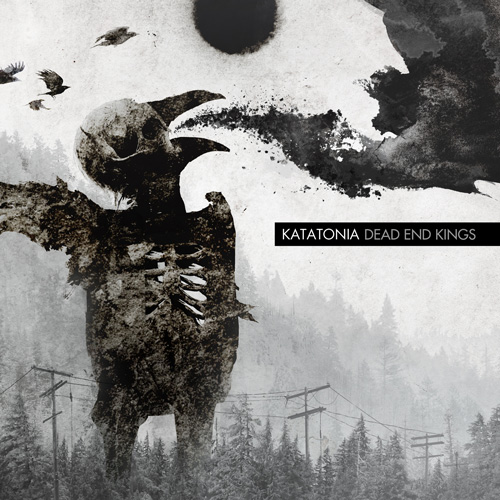
Album Review: Katatonia - Dead End Kings
At what point does consistency become stagnation? Even the most remarkable of stimuli loses its efficacy if repeated too often. It's a truth that we face on a daily basis, but one we don't often give much of our attention, instead focusing on whatever is shiny and new. It's a natural reaction to have, to be fixated on things we haven't seen or heard before. The quest to seek out as much good music as we can is never ending, and it's one of the driving forces for most fans. We love finding hidden jewels, catching up on classics that for whatever reason we missed at the time, and especially being there as the next big thing erupts.
But not everything can be novel. There's a counter-argument to the attraction of the unknown, that more comfort and enjoyment can be gleaned from another dose of the familiar, that we crave more of the same. This is obviously not true for every fan, but it is something every band will have to encounter at some point in their careers. A choice has to be made whether they will continually reinvent themselves as they progress, or whether they want to continue mining their current sound for all the gold it possesses.
Katatonia is one of those rare bands that has managed to act out both of these choices. They completely redefined who they were after the genre-defining “Brave Murder Day”, tearing down the facade of their music, but leaving in tact the heart. They established a new identity, and since then have done little to veer away from their comfort zone. And so, with each passing record, it becomes harder not to ask if there comes a point where too much of the same thing dilutes its impact.
“Dead End Kings” does little to distinguish itself from the albums that have come before, settling into the same groove, feeling oddly familiar from the first listen. Everything about the album is worn-in, the comfortable alternative to reaching out into the unknown. “Dead End Kings” is the kind of album you reach for when you know what you want, taking solace in knowing the music will always be there to deliver.
Few have managed to capture desperation and melancholy in sound, Katatonia chief among them. “Dead End Kings” is dark without being sinister, contemplative without feeling pretentious, emotional without succumbing to schmaltz. Their sound is one that is well-honed, the end result of continual refinement. That makes the album a highly polished and professional affair, but also brings to mind the critique that after so long, the band may be running through the motions more than ever before.
Certainly, there isn't much to criticize in the way of performance. Everything is handled expertly, yet at the same time feels as though there is something missing, that there should be something more to be taken from the experience. The songs are as uniformly brooding as “Night Is The New Day” was, but few if any pack the same gut-punch the best songs from that effort did. There is nothing wrong with them, but they feel hollow when directly compared to their predecessors, something the steadfast adherence to the sound allows with ease.
“Hypone” churns atop its riff, the plaintive vocals as evocative as anywhere else, but the soul of the song is missing. The pieces fit together, but the glue fails to bind them into a cohesive whole. It is that way throughout the album, the songs always falling just a bit short of the mark they aim for. “The Racing Heart”, “Lethean”, and “Dead Letters” are all of the highest quality, songs that would have found a place among the best work of the previous few albums, while never quite scaling to the summit of the absolute best material.
It is as much a testimony to the music Katatonia has made in the past as anything. Taken on its own, “Dead End Kings” is a fine album. It sounds the way it's supposed to, it feels the way it's supposed to, it's exactly what was supposed to come next from a band that knows what they are and what they want to achieve. The problem is that for all the good there is to be said about “Dead End Kings”, and there is much to be said in its favor, there's a gnawing sense that the end is approaching. It is unclear whether the issue is stalled momentum, or merely a batch of songs that are over-matched by what has come before. What is clear is that “Dead End Kings” lives squarely in a shadow it never had a chance to escape.

